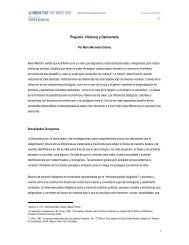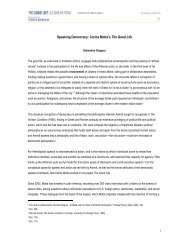Carlos Motta - La buena vida
Carlos Motta - La buena vida
Carlos Motta - La buena vida
You also want an ePaper? Increase the reach of your titles
YUMPU automatically turns print PDFs into web optimized ePapers that Google loves.
110<br />
111<br />
witnessed the production of alternative ways<br />
of social empowerment via the politicization of<br />
culture. Filmmakers such as Fernando Birri and<br />
Fernando “Pino” Solanas in Argentina; <strong>Carlos</strong><br />
Alvarez, and Jorge Silva and Marta Rodríguez in<br />
Colombia; Patricio Guzmán in Chile; and Jorge<br />
Sanjinez in Bolivia used film as a political tool<br />
to inform, instruct, educate, and stir “popular”<br />
audiences about their social conditions, and<br />
their political needs, rights, and responsibilities.<br />
A shared interest for all of them—and a central<br />
subject for my project—was the production of<br />
alternative ways to construct “public opinion.”<br />
A critical position with regard to the largely<br />
unquestioned manipulation of the mainstream<br />
media’s production of political and social consent<br />
was essential to the creation on new forms of<br />
mediatic interaction. Perhaps influenced by the<br />
recently formed cinéma vérité in France led by<br />
Jean Rouch, and its informal aesthetics, some<br />
of these <strong>La</strong>tin American filmmakers where<br />
also going out on the streets equipped with a<br />
microphone and a hand held camera confronting<br />
pedestrians with difficult questions, documenting<br />
social movements, and talking with individuals<br />
and groups about politics and society.<br />
These historical precedents, as well as my<br />
growing concern about the corporate structure<br />
of the media—and its unapologetically biased<br />
reporting in the name of the “public”—led me to<br />
use the interview form in The Good Life. It was<br />
soon clear to me though, that I wouldn’t make a<br />
film but use only the interview form to underline<br />
and contest its potential for the acquisition of<br />
knowledge and information. While interviewing<br />
is commonly only one of the features of a<br />
documentary film (along with a voice-over<br />
narration, etc.), the interview for me was the<br />
means and the end. Consequently, I sought for a<br />
form to organize these hundreds of interviews in<br />
a “democratic” way, which led me to the creation<br />
of an online archive.<br />
ED I’m glad you mentioned the media<br />
and its constitutive effects on public opinion.<br />
The agglomeration of the media into megacorporations<br />
indicates that the reproduction<br />
of the existing social order—the economic<br />
structure in which these corporations continue<br />
to be some of most profitable institutions<br />
owned by the wealthiest people on earth—is the<br />
fundamental form of consent they orchestrate.<br />
We are (too) familiar with the resulting cycle<br />
of fluff and mayhem that characterizes media<br />
entertainment logic, particularly for television.<br />
When you adopted the posture of the interviewer,<br />
but offered your set of seven questions on U.S.<br />
intervention and perceptions of democracy,<br />
obviously dissonance in the familiar mediabased<br />
model of the interview was created. Did<br />
people pick up on that? I should say, did your<br />
subjects reflect, on or off camera, on the form<br />
of media agency you yourself posed, or that you<br />
solicited from them?<br />
CM Upon beginning the project in Mexico City<br />
in 2005 I had to come up with a methodology to<br />
conduct the interviews that would work to achieve<br />
the kind of content I was looking for. I realized very<br />
soon—after several failed attempts—that the<br />
set up of the interviews I had seen and studied<br />
from several news channels and documentary<br />
films (including Jean Rouch’s Chronicle of a<br />
Summer and Vilgot Sjöman’s I Am Curious (Yellow))<br />
wasn’t the appropriate one for my project.<br />
Generally, in these works, a camera-person and<br />
interviewer approach a pedestrian or a group with<br />
a microphone in hand and confront them with<br />
a direct question (such as, “Do we have a class<br />
system in Sweden?” (Sjöman)). The pedestrian<br />
chooses whether to stop and answer or not. The<br />
dynamics of this confrontation, the initial shock<br />
it may produce, the attraction or repulsion to<br />
the camera, the individual’s time constraint,<br />
the particular bias intended with the question,<br />
etc. become constitutive of the kind of answers<br />
that interviewers seek. This fast-paced street<br />
acquisition of information and opinions is often<br />
associated with the notion of “public opinion,”<br />
which literally means the opinions of the public<br />
about a given subject in a public space confronted<br />
by the machine of the media. However, Rouch,<br />
Sjöman and other cinéma vérité makers brilliantly<br />
deconstructed this notion in the 1960s with the<br />
careful insertion of key protagonists in their films<br />
(interviewer, interviewees, camera, microphone,<br />
etc.) that openly performed and commented on<br />
their assigned roles.<br />
I chose a different approach for The Good Life.<br />
I wasn’t interested in exposing the mechanisms<br />
behind the construction of the notion of “public<br />
opinion,” but rather in inviting the interviewees<br />
to thoughtfully reflect and take time to comment<br />
on the questions I asked. Towards this aim, I<br />
never approached walking pedestrians but only<br />
individuals or groups that were sitting down in<br />
parks, waiting in street corners or hanging out<br />
in other public spaces. I invited them to answer<br />
the questions after explaining who I was, what I<br />
wanted, where the material would be presented<br />
and who was financing me. The idea was to give<br />
them as much information about my intention<br />
so that we would feel more inclined to have a<br />
dialogue.<br />
In other words, and to answer your question<br />
more directly, yes and no. “My” subjects picked up<br />
“on the form of media agency” I posed most of the<br />
time primarily because I told them. Some people<br />
chose to truly engage with the questions and<br />
would then think of me more as researcher than<br />
as a journalist. But others were disappointed to<br />
find out that I was an artist and not a journalist<br />
that would guarantee them a spot on TV!<br />
ED Your comments on the volition, often<br />
coercive, of the interviewer are a perfect segue<br />
to this question, and to the rationale behind you<br />
and I doing an Interview on the Interview, which<br />
is, after all, a riff on sociologist Pierre Bourdieu’s<br />
A Lecture on the Lecture. In this important<br />
speech, given as his inaugural address at the<br />
Collège de France in 1982, he elaborates his<br />
concept of “participant objectivation.” Briefly, he<br />
means that in attempting to represent and enact<br />
scientificity, sociology’s epistemology of certainty<br />
and objectivity often masks underlying interests<br />
that say more about the researcher and the field<br />
itself than the object of observation. In contrast,<br />
Bourdieu posits a “reflexive sociology” in which<br />
the position of the observer/researcher can be<br />
more transparent. Reflexivity also points to the<br />
ways in which power flows unequally within<br />
knowledge claims—that the “object” of inquiry<br />
is often disadvantaged by a lack of access<br />
to the concepts and categories governing its<br />
representation. It seems that as you conducted<br />
the interviews, they have more of the features of<br />
open, dialogical social exchanges than serving<br />
as instruments of knowledge acquisition. In<br />
this sense, do you see the time and space of the<br />
discursive exchange, of the “reflexive” interview<br />
itself, as “the good life”?<br />
CM The concept of “the good life” that I<br />
reference in the title of my project is borrowed<br />
from Aristotle’s Politics. It refers to the<br />
responsibilities of a citizen within the political<br />
functioning of the city-state. For him, citizens<br />
should be active participants of the construction<br />
of a democracy by engaging in social activities<br />
that are often based on discussions amongst<br />
themselves. This kind of “democratic” social<br />
interaction is the framework that I wanted<br />
to replicate in The Good Life. To ignite these<br />
discussions, I chose the form of the interview<br />
(today largely and ambiguously associated with<br />
democracy) to address and contest its use by<br />
the media, documentary film, and sociology,<br />
the set of problems it posits for the acquisition<br />
of knowledge and, of course, the complex<br />
contradictions of the act of interviewing in itself.<br />
Although these critical points are very important,<br />
their consideration is only productive to me in<br />
so far as they provide alternative ways for the<br />
implementation of a dialogical system that would<br />
help me to find out people’s actual opinions on<br />
the questions asked.<br />
In these terms, Bourdieu’s “reflexive sociology”<br />
is a very useful notion, and in particular, as you<br />
described above, the idea of the “unequal flow<br />
of power within knowledge claims.” This idea<br />
resonates in two ways in The Good Life. First, from<br />
a personal stand point, I, the interviewer/artist<br />
came to the interviewees with a set of difficult<br />
questions and expected them to answer from<br />
whatever angle they chose to. I was empowered<br />
simply by asking the questions since these<br />
demanded a degree, however little, of specialized<br />
knowledge and political engagement. Interviewees<br />
often also presupposed that I had “an answer”<br />
to the questions, what posited a second level<br />
of difference between us. To avoid this kind of




